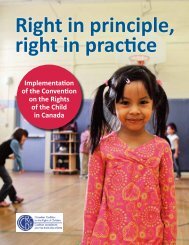Poste - Canadian Coalition for the Rights of Children
Poste - Canadian Coalition for the Rights of Children
Poste - Canadian Coalition for the Rights of Children
You also want an ePaper? Increase the reach of your titles
YUMPU automatically turns print PDFs into web optimized ePapers that Google loves.
C A N A D I A N C O A L I T I O N F O R T H E R I G H T S O F C H I L D R E N<br />
community-based services. 43 As a result, families are<br />
increasingly responsible <strong>for</strong> <strong>the</strong> financial, physical,<br />
emotional, developmental and social costs associated<br />
with caring <strong>for</strong> children with disabilities. 44<br />
Financial Assistance<br />
Provincial governments have various programs to<br />
financially assist families with <strong>the</strong> extra costs associated<br />
with disability. A sample <strong>of</strong> programs includes:<br />
• Quebec provides a supplementary family<br />
disbursement <strong>of</strong> $119.22 per month to all families with<br />
severely disabled children; 45 and<br />
• <strong>the</strong> Saskatchewan Aids to Independent Living<br />
program lends assistive devices free <strong>of</strong> charge to<br />
children and adults. The Paraplegia Program supplies<br />
additional benefits to eligible children, including<br />
prescription drugs, medical supplies, rehabilitation<br />
equipment and grants <strong>for</strong> home and vehicle<br />
modifications. 46<br />
A national study has found that in most parts <strong>of</strong> Canada,<br />
<strong>the</strong>re is little financial support <strong>for</strong> family members who<br />
are primary caregivers <strong>of</strong> persons with disabilities. In<br />
fact, most provinces and territories have no publiclyfunded<br />
income support program <strong>for</strong> caregivers <strong>of</strong><br />
children with disabilities. 47 The exceptions to this are<br />
Quebec, 48 Prince Edward Island and Newfoundland,<br />
which have provisions <strong>for</strong> parents who care <strong>for</strong> <strong>the</strong>ir<br />
children with disabilities. The federal, provincial and<br />
territorial ministers <strong>of</strong> social services intend to better<br />
coordinate income programs <strong>for</strong> people with<br />
disabilities. 49 However, it is not known if children<br />
will be a focus <strong>of</strong> this work.<br />
Social assistance to Aboriginal families on reserve is<br />
generally lower than what most provincial governments<br />
provide to <strong>the</strong> rest <strong>of</strong> <strong>the</strong> population since band councils<br />
receive funding from <strong>the</strong> federal government and federal<br />
guidelines recommend lower levels <strong>of</strong> support. There is<br />
no federal supplement <strong>for</strong> disability-related costs, so<br />
parents <strong>of</strong> children with disabilities must cover <strong>the</strong> costs<br />
<strong>of</strong> <strong>the</strong> disability <strong>the</strong>mselves or move <strong>of</strong>f reserve to<br />
receive provincial social assistance benefits. 50<br />
According to a 1995 survey <strong>of</strong> 117 parents <strong>of</strong> children<br />
with disabilities conducted by <strong>the</strong> <strong>Canadian</strong> Association<br />
<strong>for</strong> Community Care, <strong>the</strong> means tests determining<br />
eligibility <strong>for</strong> support services are too rigid, access to<br />
services varies and waiting lists are used as a rationale <strong>for</strong><br />
denying services. The cost <strong>of</strong> short-term relief care was<br />
60<br />
<strong>the</strong> most significant concern, followed by transportation<br />
and equipment costs. Half <strong>of</strong> <strong>the</strong> parents surveyed<br />
identified <strong>the</strong> absence <strong>of</strong> respite and child care services as<br />
important reasons <strong>for</strong> out-<strong>of</strong>-home placement <strong>of</strong> children<br />
with physical disabilities. 51 Parents said that foster<br />
families receive better financial support than natural<br />
families with disabled children. The <strong>Canadian</strong><br />
Association <strong>for</strong> Community Care found that <strong>the</strong> working<br />
poor are <strong>of</strong>ten worse <strong>of</strong>f than families on social assistance<br />
since welfare recipients have better supports and services<br />
available to <strong>the</strong>m <strong>for</strong> <strong>the</strong>ir children with disabilities. 52<br />
Sharon Hope Irwin, director <strong>of</strong> SpeciaLink: The National<br />
Centre <strong>for</strong> Child Care and Community Inclusion, says<br />
that primary caregivers <strong>of</strong> young children with<br />
disabilities are much less likely to be in <strong>the</strong> work<strong>for</strong>ce<br />
than o<strong>the</strong>r primary caregivers and disability-related<br />
expenses are an added burden. 53<br />
Voices<br />
<strong>of</strong> parents<br />
I am worried about cuts to subsidized child<br />
care <strong>for</strong> special needs children and <strong>for</strong><br />
funding and programming and support in<br />
school... funding to schools is being cut...<br />
So every need (programming, educational<br />
assistants) must be fought <strong>for</strong> by <strong>the</strong> parent<br />
and in some cases paid <strong>for</strong> by <strong>the</strong> parent.<br />
There are waiting lists <strong>for</strong> everything...<br />
Our employer-provided plan has been eroding<br />
and no longer covers orthotics. The drug plan<br />
is now reduced to 80 percent coverage.<br />
There are cutbacks to <strong>the</strong> assistive devices<br />
program approval process—it takes longer<br />
and funding is more difficult to access. 54<br />
Early Identification, Early Intervention and<br />
Child Care<br />
Special interventions <strong>for</strong> children with disabilities should<br />
begin as early as possible. 55 While services <strong>for</strong> children<br />
with disabilities have been developing over <strong>the</strong> past 40<br />
years, <strong>the</strong> delivery <strong>of</strong> <strong>the</strong>se services varies from




